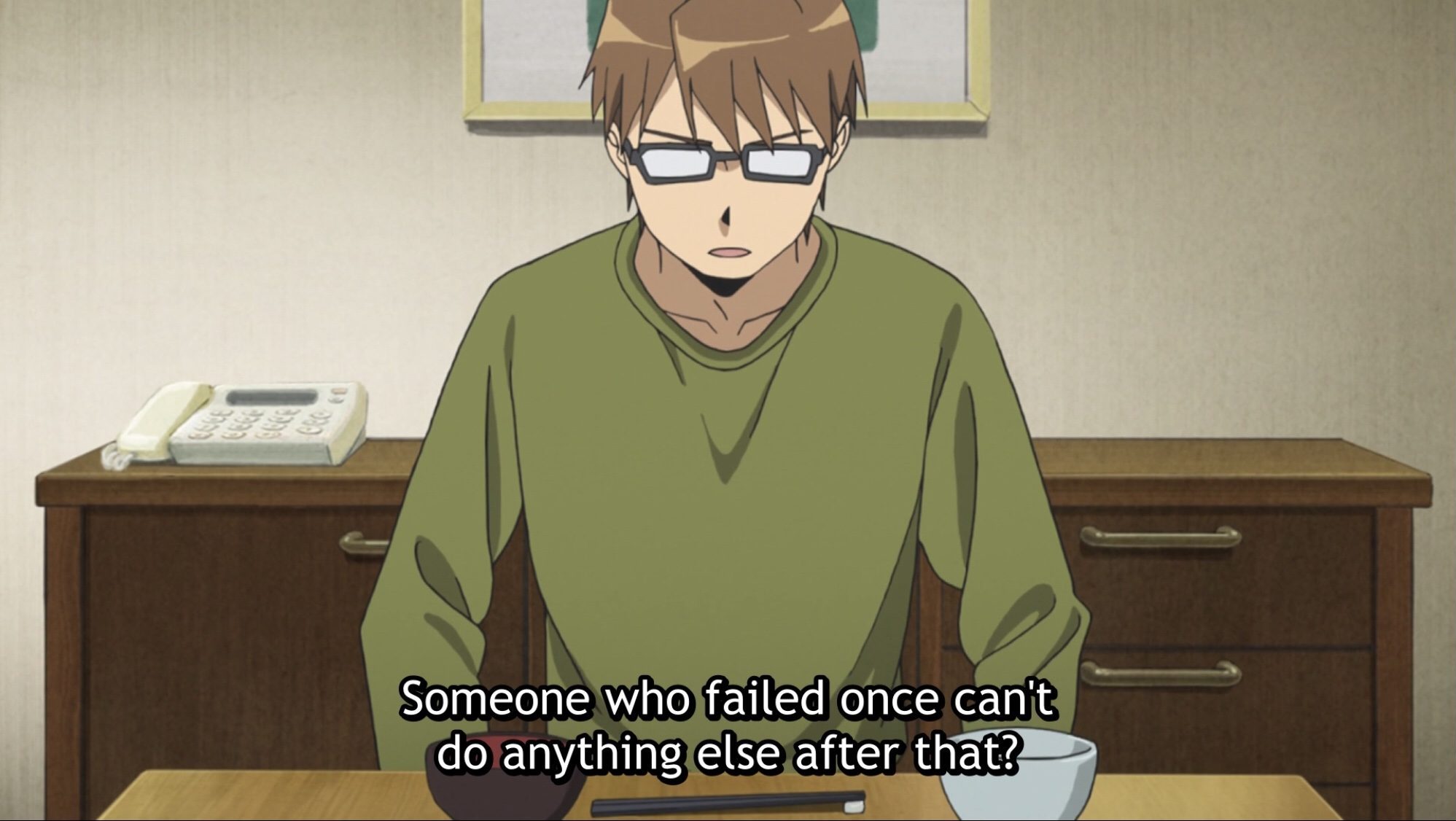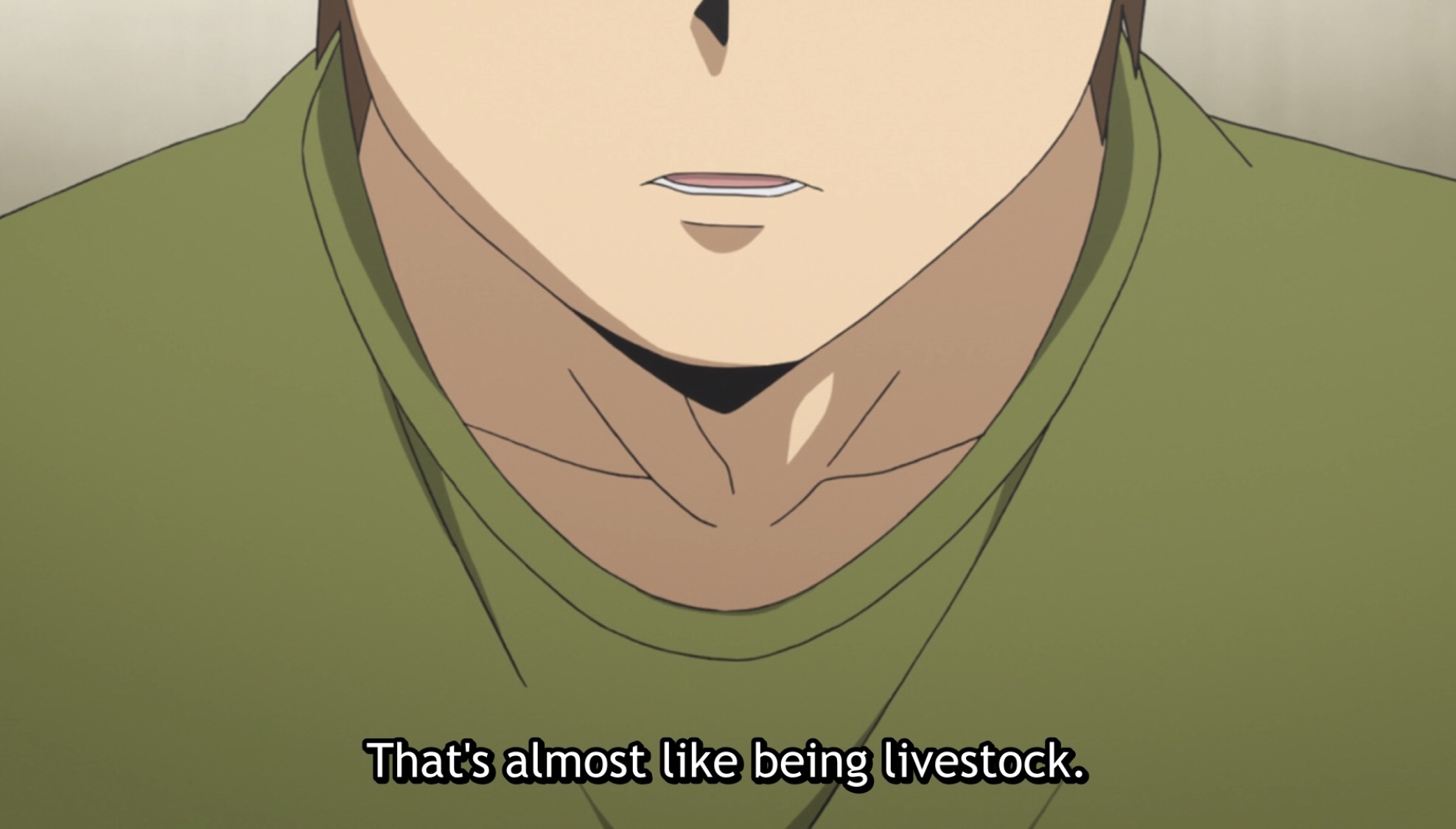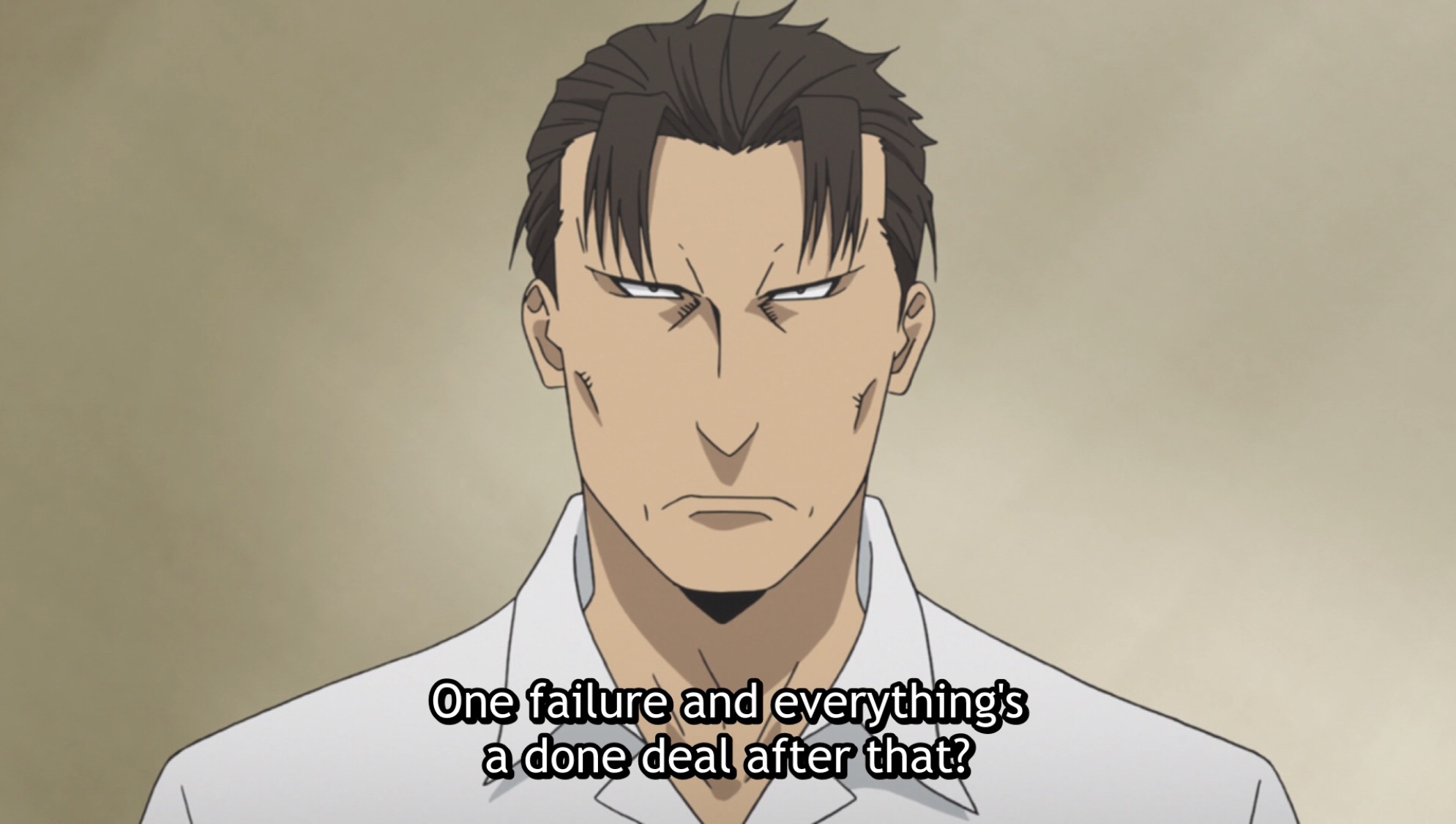I’m lower than livestock!
Yuugo Hachiken utters that phrase a number of times during Silver Spoon, a fish-out-of-water tale about a young man from the city attending an agricultural high school. Used for comical effect, he usually says as much when he’s threatened with punishment for not doing seemingly mundane chores related to the school’s chickens, cows, or horses.
But in season two of the series, in the final episode, Hachiken says it again and this time, not to humorous effect. He has returned home for a quick visit, making the trip only to pick up study notes to help his friend and love interest, Mikage. Hoping to sneak in and out quickly, he’s forced instead to stay for a family dinner. For most of us, the occasion would be happy or at least tolerable, but for Hachiken, who loathes his father, it’s a test of patience, to exhibit the growth he’s experienced as a high school freshman in the face of his dad’s unrelenting coldness and uncompromising expectations. It’s challenging for Hachiken, who wilted while studying for high school entrance exams under his father’s repression, and doesn’t experience an ounce of love or compassion from him.
Hachiken is doing well during the meal, though, until he makes a mistake by telling his father that the reason for picking up the notes is that he’s helping a friend study (When he said it, I literally gasped, “That’s a mistake, Hachi!”). His father questions him: “How can a failure like you help someone else study?”
The tension is the scene is palpable. Much like Hachiken, I have issues with self-control, unable to put aside frustration and anger when pushed beyond my boundary for patience, when goaded with words that flip a switch in me, from “normal Charles” to “crazed, spiteful, vengeful Charles.” Hachiken’s switch is flipped, but this time, having matured through his experiences with friends, teachers, and livestock, the light that comes on isn’t bright with fury; it’s muted and measured, as he speaks about forgiveness.



Through the whole of Silver Spoon, Hachiken slowly gets to know the world of farming, both in its pleasure and its brutality. The farmers care for their animals, but still, all it takes is a bad moment leading to an injury for an animal to be sent to slaughter. Hachiken feels the same—one failure and he’s unable to be forgiven. He’s not given an opportunity to arise, to right himself, to do better.
I’ve fouled up plenty in my life—more often than not in terms of moral failure—but those moments have been followed by much forgiveness—by God, by family, by friends. I’ve never felt exactly Hachiken does in that moment, shown such spite from a loved one, but I still understood it so well. How could I know that situation when I’ve rarely or never been through it? The answer to that was difficult for me to accept because it’s repulsive to me. It’s the worst conclusion I could have reached, but it’s true and inescapable. I realized that in that scene I’m not Hachiken at all—I’m his father.
Recently, two news stories came to my attention. One involved a professional football player who hit his girlfriend, but wasn’t going to face charges for the crime. Another involved a man living about three hours from me, who killed his wife and children. I visited the latter’s Facebook page and saw comment after comment telling the man to go to hell and viciously predicting that he would be assaulted in prison. A common refrain, too, was name-calling, particularly using the phrase, “fat pig.”
Fat pig. Livestock—he was being treated as livestock.
I’m not saying the man doesn’t deserve punishment. I’m not even saying that he doesn’t deserve the words being thrown his way. But what I realized was this: I wanted to join in on the name-calling. I wanted to leave a message that would hurt him, that would further push his buttons and make him better understand the actions he committed, as if this mad man was concerned in this moment with social media responses from a stranger! But the thing is, that’s not how I want to live. I want to live by my faith, which tells me to turn the other cheek, to act toward others in a way that I would want them to act toward me, to forgive because I’ve been forgiven much, because I’m exactly the same—the same as this foul murderer, often living my life in vicious self-regard.
The oppression that Hachiken feels from his father is done in the same vein with which I levy judgment and dole out imagined punishment upon people—both those I know and those I don’t—and upon society at large. I can blame this attitude on a lot of things, but ultimately it comes down to a heart problem. I’m better than everyone else. They are all below me. They are livestock.
And as I lead them to slaughter, whether with harsh words directly to an individual or just in the transom of my mind, I become more and more like Hachiken’s dad, the most unsavory of characters in Silver Spoon, one without the empathy, compassion, and kindness of which humans are capable. I become the wild beast. It’s a transformation that’s ugly and violent, and one that I must flee from for the sake of others, but most of all for myself, as I would rather not live out that cruel irony, a man who hoped to love others becoming a beast who feeds on other livestock.
—
Featured art by ハラダミユキ (reprinted w/permission), Silver Spoon can be streamed on Crunchyroll.


I think I watched the first episode of this anime, but then I stopped watching it for some reason.
It is REALLY REALLY good!
What an incredible post! It must have been hard, to draw up a comparison between yourself and Hachiken’s dad, but I think we (myself included) can all be guilty of looking down on other people, of treating them like livestock. We may not treat our own children as harshly, but aren’t we all God’s children? This was a much-needed reminder to treat others with kindness, compassion, and forgiveness. Thank-you.
No, thank you! I appreciate the kind words and encouragement from you.
I work at a tech support desk and I can totally relate with you on this, Charles.
You know the struggle better than I do, probably!